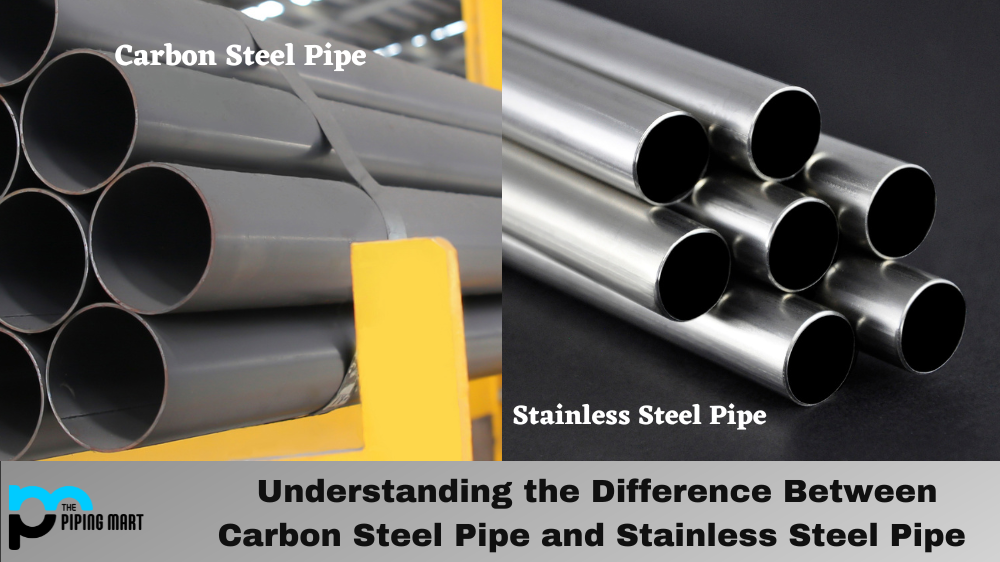When it comes to industrial piping, there are a variety of materials available for use. Two of the most popular options are carbon steel pipe and stainless steel pipe. These two materials offer different benefits, so it’s important to understand how they compare to each other. Let’s take a closer look at carbon steel pipe vs stainless steel pipe to determine which one is better for your application.
Carbon Steel Pipe
Carbon steel pipes are made from an alloy of iron and carbon. The higher levels of carbon in the alloy make the pipes harder and stronger than other types of steel, but this also makes them more prone to corrosion. Carbon steel pipes can be used in various industries including manufacturing, construction, food processing, oil & gas extraction, power generation, and many more. One advantage of using carbon steel pipes is that they tend to be less expensive than other types of metal pipes due to their lower cost production process.
Stainless Steel Pipe
Stainless steel pipes are made from an alloy of iron, chromium, nickel, molybdenum, and other metals. This combination gives stainless steel its rust-resistant properties while making it durable enough for high-temperature applications. Stainless steel pipes can also be used in many industries, including automotive manufacturing, food processing plants, pharmaceutical companies, petrochemical plants, oil refineries, etc. Since stainless steel is resistant to corrosion it is ideal for applications where long-term exposure to chemicals or moisture could cause damage or contamination. Additionally, since stainless steel is non-magnetic, it can also be used in applications where magnetic properties need to be taken into consideration such as medical imaging equipment or electrical wiring systems.
Difference Between Carbon Steel Pipe and Stainless Steel Pipe
Carbon steel pipes and stainless steel pipes have slight variations in composition, which results in a significant difference in the properties of each type. Carbon steels contain up to 2% carbon and are often used for structural applications such as pipe supports. Stainless steels contain at least 10% chromium, making them extremely corrosion resistant compared with carbon steel. In addition, stainless steel pipes are much more durable than carbon steel since they have better weldability and formability. Although both types of pipes can be used for many industrial applications, it is important to consider their differences when deciding which type is best suited for a specific task. Taking this into account, stainless steel remains the material of choice when seeking maximum resistance to erosion and wear.
Carbon Steel Pipe vs Stainless Steel Pipe Cost
One of the primary factors to consider when choosing between carbon steel pipe and stainless steel pipe is the cost. Carbon steel pipe is typically much cheaper than stainless steel pipe. The exact price difference will vary depending on the type of steel, the size and thickness of the pipes, and any other factors.
Carbon Steel Pipe vs Stainless Steel Pipe Strength
Another factor to consider is the strength of the pipes. Carbon steel pipes are typically stronger than stainless steel pipes. This is due to the fact that carbon steel pipes are made from a stronger material. However, this does not mean that stainless steel pipes are weak – they are just not as strong as carbon steel pipes.
Carbon Steel Pipe vs Stainless Steel Pipe Durability
When it comes to durability, carbon steel pipes and stainless steel pipes are both very durable. They are both able to withstand high temperatures and pressures without breaking or rupturing. However, stainless steel pipes are more resistant to corrosion than carbon steel pipes. This means that they will last longer, especially in environments where there is a lot of moisture or chemical exposure.
Carbon Steel Pipe vs Stainless Steel Pipe Maintenance
Another factor to consider is the maintenance required for each type of pipe. Carbon steel pipes require more maintenance than stainless steel pipes. This is because they are more susceptible to corrosion and rusting. Stainless steel pipes, on the other hand, require less maintenance as they are more resistant to these types of damage.
Carbon Steel Pipe vs Stainless Steel Pipe Appearance
The appearance of carbon steel pipes and stainless steel pipes can also be a factor in your decision-making process. Carbon steel pipes have a duller appearance than stainless steel pipes. Stainless steel pipes, on the other hand, have a shiny appearance that can be appealing for some applications.
Carbon Steel Pipe vs Stainless Steel Pipe Weight
Weight can also be a deciding factor when choosing between these two types of metal piping. Carbon Steel weighs less than Stainless Steel which could be important depending on your project requirements
Carbon Steel Pipe vs Stainless Steel Pipe Magnetism
Carbon Steel becomes magnetic when heat treated however Stainless Steel does not meaning if you need non-magnetic piping for your project Stainless Steel would be ideal
Conclusion
With so many different types of piping materials available today, it can take time to decide which is suitable for your application. Consider all aspects such as cost efficiency, durability and resistance when deciding between carbon steel pipe and stainless steel pipe – you want something that will last long term while meeting all safety standards too! For industrial businesses looking for reliable piping solutions that won’t break their budget or corrode over time – both carbon steel pipe and stainless steel pipe are excellent options worth considering carefully before taking out your wallet!

Pipingmart is B2B portal specializes in industrial, metal and piping products. Also, share latest information and news related to products, materials and different types grades to help business dealing in this industry.




